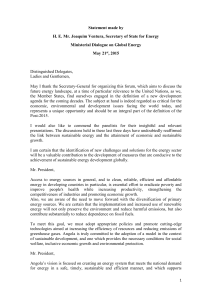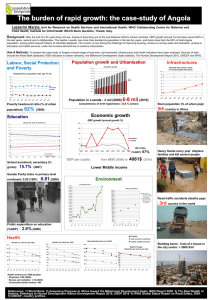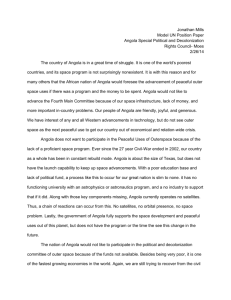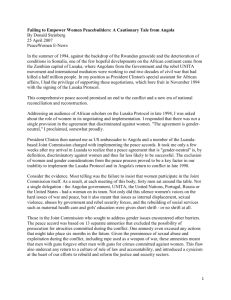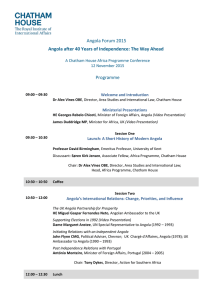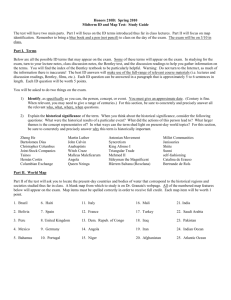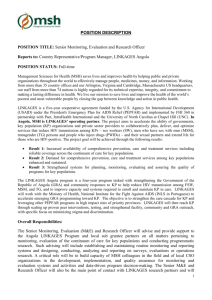ADVANCE QUESTIONS TO ANGOLA BELGIUM
advertisement
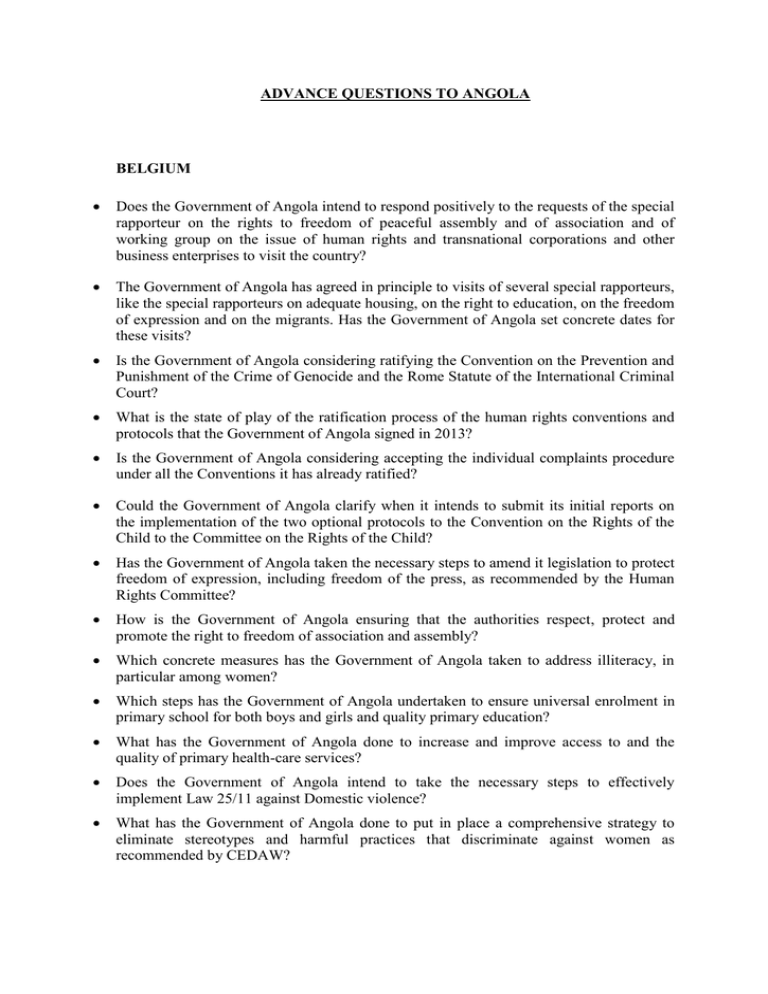
ADVANCE QUESTIONS TO ANGOLA BELGIUM Does the Government of Angola intend to respond positively to the requests of the special rapporteur on the rights to freedom of peaceful assembly and of association and of working group on the issue of human rights and transnational corporations and other business enterprises to visit the country? The Government of Angola has agreed in principle to visits of several special rapporteurs, like the special rapporteurs on adequate housing, on the right to education, on the freedom of expression and on the migrants. Has the Government of Angola set concrete dates for these visits? Is the Government of Angola considering ratifying the Convention on the Prevention and Punishment of the Crime of Genocide and the Rome Statute of the International Criminal Court? What is the state of play of the ratification process of the human rights conventions and protocols that the Government of Angola signed in 2013? Is the Government of Angola considering accepting the individual complaints procedure under all the Conventions it has already ratified? Could the Government of Angola clarify when it intends to submit its initial reports on the implementation of the two optional protocols to the Convention on the Rights of the Child to the Committee on the Rights of the Child? Has the Government of Angola taken the necessary steps to amend it legislation to protect freedom of expression, including freedom of the press, as recommended by the Human Rights Committee? How is the Government of Angola ensuring that the authorities respect, protect and promote the right to freedom of association and assembly? Which concrete measures has the Government of Angola taken to address illiteracy, in particular among women? Which steps has the Government of Angola undertaken to ensure universal enrolment in primary school for both boys and girls and quality primary education? What has the Government of Angola done to increase and improve access to and the quality of primary health-care services? Does the Government of Angola intend to take the necessary steps to effectively implement Law 25/11 against Domestic violence? What has the Government of Angola done to put in place a comprehensive strategy to eliminate stereotypes and harmful practices that discriminate against women as recommended by CEDAW? CZECH REPUBLIC Does the Government of Angola consider issuing a standing invitation to the UN human rights Special Procedures? When will the Government of Angola ratify the Convention against Torture and Other Cruel, Inhuman or Degrading Treatment or Punishment and its Optional Protocol following the signature of these documents in 2013? How is the Government going to react to several reports on the use of excessive force by members of the state security forces especially against human rights defenders, journalists and migrants? What measures is the Government of Angola taking to improve the situation of migrants in the country and to secure their human rights? How does the Government tackle the problem of alleged sexual violence against female migrants? How does the Government of Angola intend to improve the protection of freedom of media including the abolition of censorship and protection of journalists against attacks and harassment? GERMANY Despite its acceptance during the first UPR in 2010 of the recommendation to strengthen efforts to prevent arbitrary detention, excessive use of force during public assemblies, arbitrary arrest and detention as well as acts of torture and ill-treatment against individuals in detention by police and security forces still occur. How does the government ensure that the freedom of assembly is respected and that thorough, credible and impartial investigations into all allegations of abuse by members of the security forces take place? And if a violation is found, what steps are taken against the perpetrating individuals or institutions? During the 2010 review, Angola accepted three recommendations in relation to human rights defenders, committing in particular to their protection and the protection of journalists. However, human rights NGOs again and again face problems with their registration, making their work difficult. Journalists complain of being subject to increased intimidation and harassment. What steps has the government taken to ensure the safety of journalists? Are organizations that exist only in one province also invited to participate in the “Council for the official hearing and social consultation” (Conselho de Auscultaçăo e Concertaçăo Social (CACS))? Over the past years, large-scale evictions have taken place. Angola has accepted recommendations to take necessary measures to ensure that eviction is a last resort, to adopt legislation and guidelines that define the relevant circumstances and safeguards for the enforcement of the eviction, as well as the provision of necessary assistance to evicted persons. What steps has the government taken to ensure that these recommendations are realized? To what extent has the goal to build 1 million new accommodations been carried out, and how is access to this new housing space ensured? NETHERLANDS Whilst recognizing the efforts made in human rights training for the police and security forces, will the Government of Angola take the appropriate measures to address concrete cases of violence and abuse by the police? And is the Government of Angola prepared to introduce a comprehensive Plan of Action, including the investigation, prosecution and punishment of those responsible, with the aim of eliminating such abuses? What measures will the Government of Angola take to address violence and discrimination on the basis of sexual orientation or gender identity? Is the government of Angola planning to accede to the Rome Statute of the International Criminal Court (ICC) and fully align its national legislation with this Statute by incorporating provisions to cooperate promptly and fully with the International Criminal Court and to investigate and prosecute genocide, crimes against humanity and war crimes effectively before its national courts, and accede to the Agreement on Privileges and Immunities of the Court (APIC)? SWEDEN What concrete measures is the Government of Angola taking to prevent cases of human rights violations by the police and the security forces? What concrete measures are the authorities taking in order to end the extensive suppression of freedom of expression and the press? UNITED STATES OF AMERICA What will the Government of the Republic of Angola (GRA) do going forward to help create an environment where journalists, civil society, trade unionists, and opposition members can operate freely and independently without fear of intimidation, harassment, arbitrary arrest, or torture? What government mechanisms are in place to hold security forces and government officials accountable for unlawful killings or sexual violence? What reforms does the GRA propose in the judiciary to help ensure that credible investigations into allegations of unlawful killings by security forces occur? Can the GRA provide updated statistics on domestic violence in Angola? What steps is the government taking to increase investigations and prosecutions of such cases, especially in rural areas? We note the GRA’s ongoing efforts to revise the Collective Bargaining Act, the Trade Union Act, and the Strike Act. What steps has the government taken to ensure that the trade unions of public servants not engaged in the administration of the State have the right to negotiate wages and other terms and conditions of employment with their employers under the new Constitution and consistent with the GRA’s commitment to respecting and promoting the ILO principles and rights to organize and to bargain collectively?
